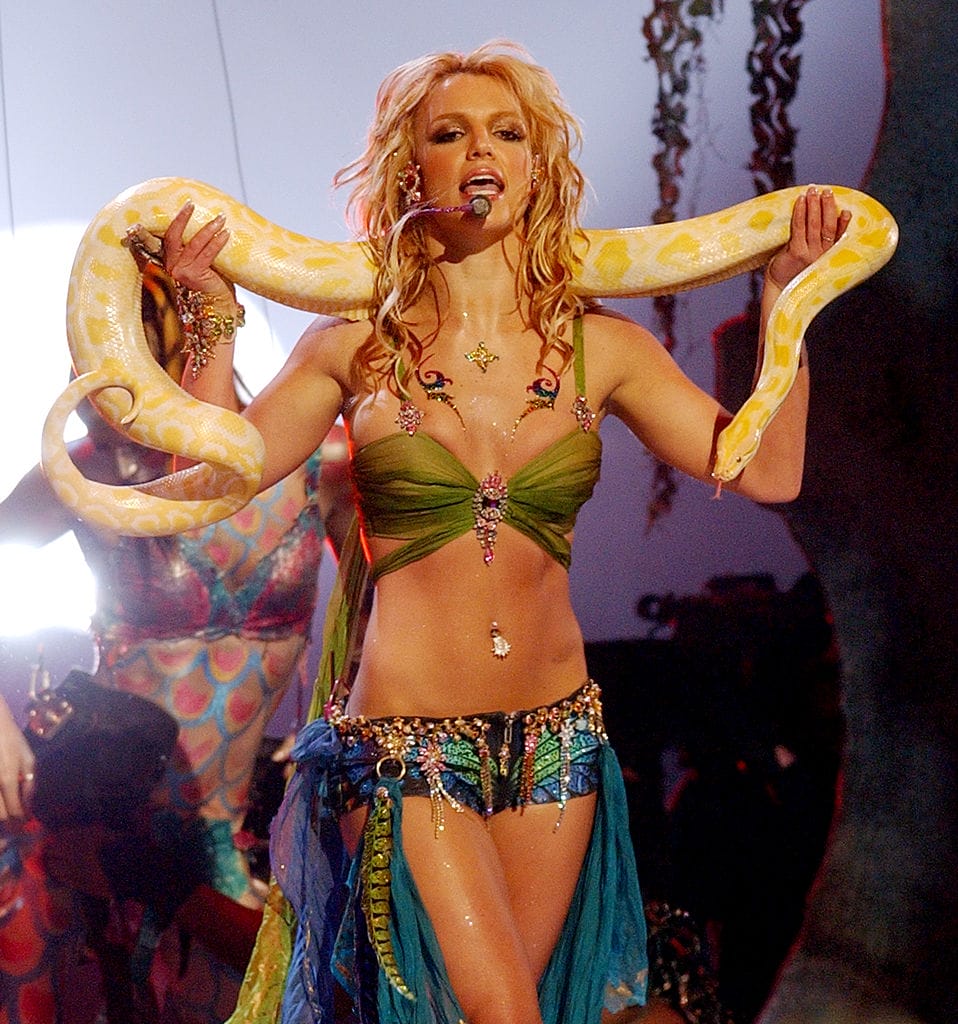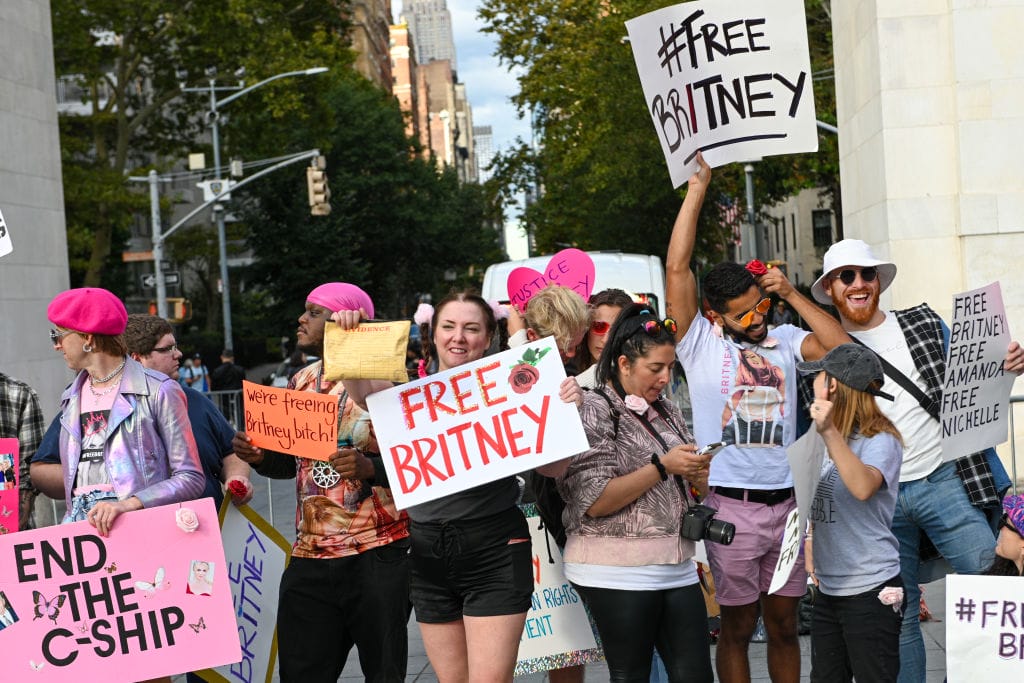Words by Ella Alexander

Photo by Kevin Mazur/WireImage
In 1847, Charlotte Brontë published Jane Eyre, in which a woman was locked up in an attic after a man declared her mad. This man wasn’t a medic, he was her husband. She would cry at night so loudly that other members of the household heard, yet everyone turned a blind eye.
Nearly 200 years later, Britney Spears – a healthy, working woman – is still being held against her will by her father after 13 years under his conservatorship. She has been placed on drugs against her consent and prevented from having more children. Her situation is of course different to Brontë’s imprisoned Bertha Mason in that Spears is wealthy and white, rather than Creole like the fictional character. But the narrative around the singer’s mental instability of 2007 has prevailed, allowing members of her own family to exploit and control her. Spears might be locked in a gilded cage in LA, rather than a chilling attic in the UK, but it is yet another example of how men can impose power over women by calling them mad. Once we have undermined or questioned a woman’s character, it becomes easier to dehumanise them. To force them to take birth control against their will, or to make them work when they don’t want to – to strip them of their freedom.
Once we have undermined or questioned a woman’s character, it becomes easier to dehumanise them
As we’ve seen from numerous women’s stories shared since the release of the Framing Britney documentary in February, from Mischa Barton to Sienna Miller, once you are considered a ‘fallen woman’ or ‘hysterical’, it is very difficult to shake that perception, even if you have as much privilege as Spears. If this can happen to her, a rich and talented star, then how much easier is it to silence women with less privilege? What we’ve seen with Spears is how abuse towards those with disability and/or mental illness are often conflated by blatant sexism and gender discrimination. Disabled and mentally ill people often go unheard, and their conditions used against them, as is the case here. When you couple that with huge amounts of money (Jamie Spears is in control of his daughter’s nearly $60 million fortune), then it’s easy to see how profitable the conservator industry can be. It becomes legal larceny on a huge scale.
According to the New York Times, Spears’ father now earns about $16,000 per month, plus $2,000 a month for office space rent, for his role as a conservator, plus a percentage of various deals signed for his daughter. There is a lot we don’t know about the extent of Spears’ mental health, but we do know that she is able enough to work, perform for audiences, record albums and make money – cash that is then overseen by her father. She isn’t, however, apparently capable of making a decision about whether to have a baby or how to spend her earnings. She isn’t even allowed to choose the colour of her kitchen cabinets.

The Free Britney Rally. Photo by Alexi Rosenfeld/Getty Images
It seems almost too obvious to point out that this wouldn’t have happened if Spears were male. Famous men, who suffer mental breakdowns, simply are not controlled in the same way. Just as the patriarchy has helped Jamie Spears assert control over his daughter, it has also worked to prevent similar fates for men. We have seen many male celebrities suffer poor mental health and addiction issues, but never have we seen them have their futures removed from them – we have never seen them lose control of their finances, their careers or their choice to have a child. To my knowledge (and I’m happy to be corrected), no high-profile man has ever had to relinquish his freedom to his father. It just does not happen. Journalist Dr Ateh Jewel said it best on Instagram today, “Can you image Justin Bieber in his drag racing in public streets, spitting into crowds, meltdown days being told he had to get a vasectomy by his mum, just in case he had a baby while he was off the rails?”

Photo by Ethan Miller/Getty Images
Why are women always shouted down when they talk about their pain?
Spears’ circumstances speak of a far wider problem about women still not having full autonomy over their bodies. In April, the UN published a report which revealed that nearly half the women from 57 developing countries do not have autonomy over their bodies and future, spanning healthcare, contraception and sex. Bodily autonomy can of course be violated in many ways – rape (which given the pitiful 1.6 per cent charge rates is all but decriminalised in the UK), forced sterilisation (China is currently trying to rebrand this as feminism), homophobic and transphobic violence, marital rape (only made illegal in the UK in 2003), denial of education and healthcare, and reproductive coercion. This is a global scandal and we, as women, have been gaslit about how much it all hurts for centuries. Only yesterday, the BBC published a story about how having a coil fitted shouldn’t hurt – to which women around the world said, “actually, it really does.” My friends with babies are always asked by health visitors or medical professionals about the child over their own wellbeing, as if their bodies are simply vessels in which to bear and sustain a baby. Why are women always shouted down when they talk about their pain, be it physical or mental? In fact, why do we assume pain for women is normal at all? I don’t accept that remaining silent over these issues will ever lead to a brighter future.

Britney Spears (Photo by Kevin Mazur/WireImage)
What would happen if we actually listened to women when we voice a painful truth? If we provided a solution or changed the status quo? What would have happened if those sitting in that big LA courthouse had bothered to listen to Britney Spears when she voiced a list of issues with the conservatorship years ago? It’s 2021, yet one of the world’s most famous and successful women is having to beg to be freed of a legal conservatorship that binds her every move, an arrangement she has compared to human trafficking. “It’s embarrassing and demoralising what I’ve been through, and that’s the main reason I didn’t say it openly,” she said in her testimony. “I just want my life back.”
This article originally appeared in Harpersbazaar.com



